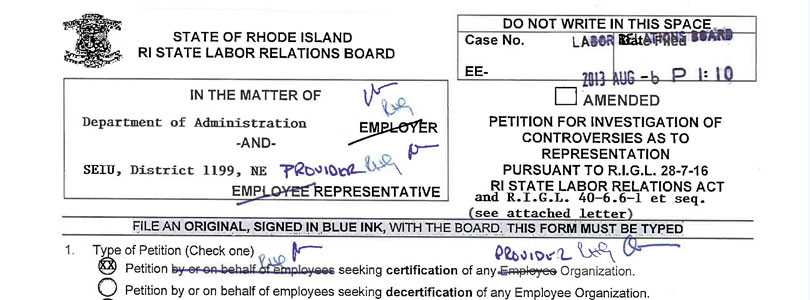When Labor’s Involved, the Board Asserts Its Own Lack of Authority
The RI Center for Freedom & Prosperity has released a statement objecting to the decision of the State Labor Relations Board (SLRB) to dismiss its request to postpone an election concerning the unionization of independent child care providers whose clients receive state assistance:
In a brief and vague letter, the State Labor Relations Board (SLRB) dismissed a request by the Rhode Island Center for Freedom & Prosperity to await the landmark precedent that the U.S. Supreme Court will likely set in early 2014 about whether or not independent home care providers can be classified as a kind of public employee solely for the purpose of unionization. Submitting its request in the interests of the Rhode Island taxpayer, the Center had suggested that no election should be held for the certification of the Service Employees International Union (SEIU) to represent the providers until the Constitutionality of doing so is clarified.
Contrary to common practice evident in communications with officials at every level of government, from local zoning authorities to top legal staff in the Department of Administration, the SLRB’s dismissal, signed by administrator Robyn Golden, simply asserts that law and regulation produce the outcome that the board apparently preferred, without a single citation, as follows:
Based upon the information elicited through your correspondence, please be advised that the Board has determined that your requests shall hereby be denied. Please be advised, in matters of this nature, again, it is not the Board’s policy to entertain requests from organizations that are not a party to the case, nor have any standing in the matter. Regardless, please be advised that it is also not within the Board’s statutory authority to act on your request or any requests of this nature.
A review of both the statutory language creating and empowering the board and the “general rules & regulations” that the board has promulgated finds no restrictions on who has standing to offer the SLRB information and suggestions concerning its activities. Moreover, there is in law or regulation no requirement that bars the board from postponing elections indefinitely, much less for a matter of months.
Indeed, the relevant regulation (8.02.5) places no restrictions whatsoever upon the board concerning its timing for elections or concerns that it may consider in setting the date, other than to seek to maximize workers’ ability to vote:
If the Board determines, as part of its investigation of a question or controversy concerning representation, that an election by secret ballot shall be held, it shall provide that such election be conducted by an Agent of the Board at such time and place, and upon terms or conditions, as the Board may specify.
Every effort shall be made to schedule the election to reasonably accommodate all work shifts.
The fact that the regulation seeks fair treatment and consideration of eligible employees suggests, if anything, that an election should be scheduled so as to ensure that the vote is not voided by being declared unconstitutional soon after it is held.
One could go so far as to argue that, since the Department of Administration and the SEIU signed an “Agreement for Consent Election,” the SLRB has even wider authority to consider the interests of the child care providers in setting the date of the election, because regulation 8.02.3 states that such agreements mean the employer and the labor union have “waived their statutory right to an informal hearing and other consent election processes.”
The question of why a government board would make assertions that limit its own authority unnecessarily may be better answered in retrospect, after the outcome is known. For the time being, it would be reasonable to surmise that established players in Rhode Island are not used to receiving formal requests from a second, oppositional perspective.



